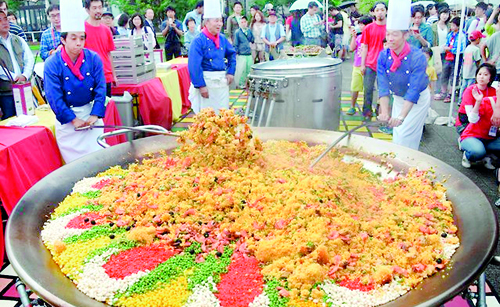Sunday Times 2
Climate change and air pollution will lead to famine by 2050
The world is expected to need 50 per cent more food by 2050, with around four billion more mouths to feed.
But this food could soon be in short supply due to increasing temperatures and ozone pollution, according to a U.S. study.
As a result, rates of malnourishment in the developing world could increase from the current 18 per cent to 27 per cent within the next four decades.
Previous research has shown that both higher temperatures and ozone pollution can damage plants and reduce crop yields, but until now, nobody has looked at these together.

Japanese chefs cook rice in Tokyo to make enough paella for 2,000 people on July 5.The latest research looked in detail at how both these changes affect global production of four leading food crops - rice, wheat, corn, and soy. These crops currently account for more than half the calories humans consume worldwide (AFP)
And while rising temperatures are widely studied, the impact of air quality on crops is less recognised, the study’s authors claim.
The latest research looked in detail at how both these changes affect global production of four leading food crops – rice, wheat, corn, and soy.
These crops currently account for more than half the calories humans consume worldwide.
It predicts that effects will vary considerably from region to region, and that some of the crops are much more strongly affected by one or the other of the factors.
For example, wheat is very sensitive to ozone exposure, while corn is much more adversely affected by heat.
In the U.S, tougher air-quality regulations are expected to lead to a sharp decline in ozone pollution, mitigating its impact on crops.
But in other regions, the outcome ‘will depend on domestic air-pollution policies,’ Professor Heald said. ‘An air-quality cleanup would improve crop yields.’
Overall, with all other factors being equal, warming may reduce crop yields globally by about 10 per cent by 2050, the study found.
The research was carried out by Colette Heald, an associate professor of civil and environmental engineering (CEE) at MIT, former CEE postdoc Amos Tai, and Maria van Martin at Colorado State University.
Ozone pollution can be tricky to identify, Professor Heald says, because its damage can resemble other plant illnesses, producing flecks on leaves and discoloration.
And while heat and ozone can each damage plants independently, the factors also interact.
For example, warmer temperatures significantly increase production of ozone from the reactions, in sunlight, of volatile organic compounds and nitrogen oxides.
Because of these interactions, the team found that 46 per cent of damage to soybean crops that had previously been attributed to heat is actually caused by increased ozone.
Under some scenarios, the researchers found that pollution-control measures could make a major dent in the expected crop reductions following climate change.
For example, while global food production was projected to fall by 15 per cent under one scenario, larger emissions decreases projected in an another scenario reduce that drop to nine per cent.
Agricultural production is ‘very sensitive to ozone pollution,’ Professor Heald says, adding that these findings ‘show how important it is to think about the agricultural implications of air-quality regulations.
‘Ozone is something that we understand the causes of, and the steps that need to be taken to improve air quality.’
Earlier this year, the IPCC warned that as well as lack of food supply, climate change would cause storm surges, flooding and heatwaves in the coming decades.
It argued that rising temperatures will exacerbate poverty and damage land and marine species.
It also claimed that the world is in ‘an era of man-made climate change’ and has already seen impacts of global warming on every continent and across the oceans.
And experts warned that in many cases, people are ill-prepared to cope with the risks of a changing climate.
© Daily Mail, London

